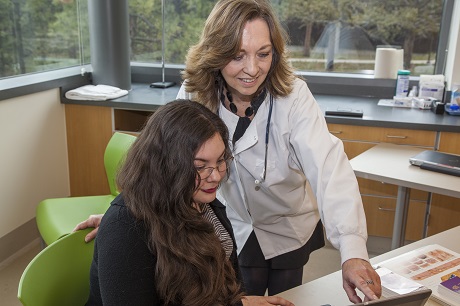Data-Keepers are the Core of Care
COCC program trains students for diverse, developing field of Health Information Technology
Update: Medical Billing & Coding World, an online career development resource for
students researching an education in health care information specialties, recently
ranked Central Oregon Community College’s (COCC) coding and billing program as Oregon’s
best on its 2018-19 “50 Best School Programs for Medical Billing and Coding,” a state-by-state evaluation. Criteria for the distinction included accreditation,
affordability, practicum experience and job placement support, among other considerations.
When the Zika virus suddenly darted across the globe in 2015, uncertainty followed
with it. The World Health Organization, faced with developing a reaction plan, scrambled
to generate health guidelines to help corral and manage infection rates. Naturally,
they tapped into patient data. Lots of it.
“It’s from the work that health information technicians and managers do,” said Wendy
Earthsong, assistant professor of Health Information Technology (HIT) at Central Oregon Community College (COCC), referring to the resources available
for data mining. “That data is coming from the material and information that we handle.”
Byte by byte, patient by patient, aggregate health data can have a seismic effect
when it comes to addressing a global health crisis. Of course, zoomed in, that data
is most pertinent to the care and well-being of the individual patient it represents.
Managing and processing this material—establishing the very core of a patient’s care—are
the trained info technicians who draw on organization, detail and a sense of stewardship
to carry out their work.
“We’re not a tech program,” explained Earthsong, addressing a common misconception. “We teach legal, ethics, analytics, compliance, insurance, public health—it’s all about a patient-centered model.”
COCC’s HIT program starts a new cohort of up to 30 students each fall. These students have already put three prerequisite classes behind them and are ready for lessons in human anatomy, medical terminology, business communication and data collection, among other subjects.
The program yields a series of certificates along the way, each a stepping stone that cumulatively builds into an associate degree. Punctuating both years is a hands-on, 40-hour practicum experience—at places like doctors’ offices and hospitals—that puts training into action during the weeklong summer internships.
Like a Swiss Army knife, there are many foldout tools to a career in HIT, all combining to be part of the same knowledge base. Some skills are insurance or billing related. Others are coding specific, taking data through a system of parsing and categorizing. Patient interactions and working among teams, even guiding medical staff and administrators through things like HIPAA regulation updates, can be part of the job.
Many will finish the degree in two years. Some, due to work and family obligations,
will split the second year into two segments—one of several customized approaches
that makes the program feasible for busy lives—and, while taking an extra year, it
creates the just-right recipe of flexibility and schoolwork.
COCC’s training is accredited by the Commission on Accreditation for Health Informatics
and Information Management Education, making it one of only two schools in the state
to carry that distinction. It preps students for both the Registered Health Information
Technician (RHIT) and Certified Coding Associate (CCA) exams, the nationally recognized
standards. That’s what employers are looking for, explained Michelle Aistear, the
program’s new director and a COCC HIT grad herself. “You can’t sit for those until
after you have your associate degree.”
Workers can gravitate to one specialty. “I got into this program to be a coder,” said
Linda Carlin, who heads back to COCC this fall for year two of her training. Based
in the remote area of Alfalfa, she plans to ultimately work from home, an option for
some in the coding world. “There’s so much opportunity in this field, it’s a huge
field.”
In fact, the U.S. Bureau of Labor Statistics forecasts a steady growth rate of 13
percent in the profession from 2016 to 2026, due in part to the sheer volume of the
country’s older population and a resulting bounce in the health care workforce. “This
is a skill set that is more and more in demand,” said Earthsong. “Health care is not
just hospital-based anymore.”
Graduates might work in a clinic, a dental practice or maybe an ambulatory surgery
center, among other settings. According to figures from the U.S. Department of Labor,
the 2017 median salary for the sector was $39,180.
And those keen on working their way up the ladder or creating more opportunity, Aistear
pointed out, will find a number of online bachelor’s degree programs. That might become
more of a norm as the industry mushrooms. “I think what’s going to happen in the next
five years,” said Earthsong, “because of the accrediting bodies, you’re going to see
more looking at bachelor’s degrees.”
Carlin, after her first summer internship, is already aware of doors opening ahead.
“When you leave this program, you’re prepared for success,” she said. “You’ve already
had the two directed practices, you’ve already been exposed to the workplace and met
people who can become references and contacts for you. It prepares you to go straight
from college into a job.” And into the core of health care.
For more details, visit the Health Information Technology program at Central Oregon Community College or call 541-383-7700.
By Mark Russell Johnson, COCC College Relations

